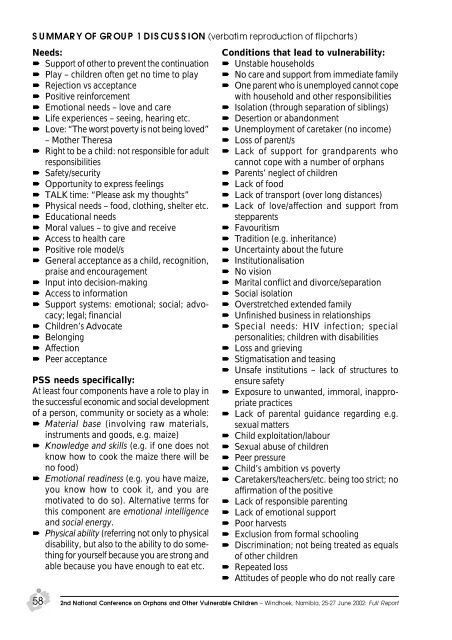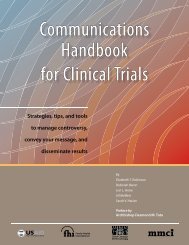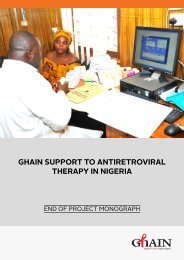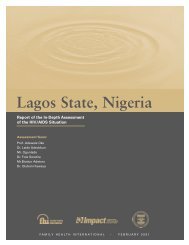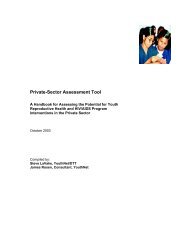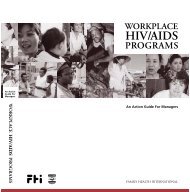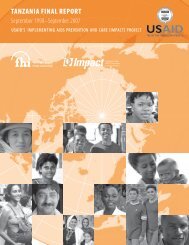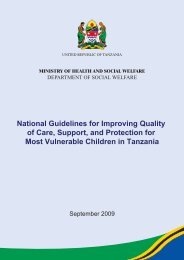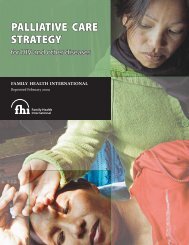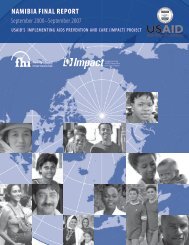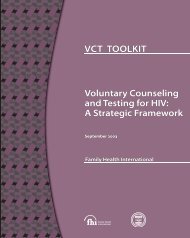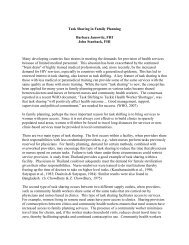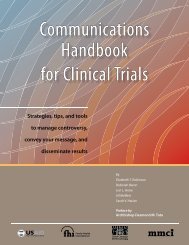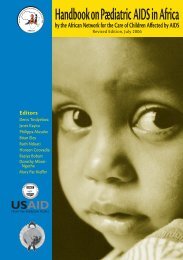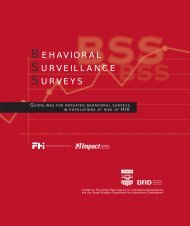2nd National Conference on Orphans and Other ... - FHI 360
2nd National Conference on Orphans and Other ... - FHI 360
2nd National Conference on Orphans and Other ... - FHI 360
You also want an ePaper? Increase the reach of your titles
YUMPU automatically turns print PDFs into web optimized ePapers that Google loves.
SUMMARY OF GROUP 1 DISCUSSION (verbatim reproducti<strong>on</strong> of flipcharts)<br />
Needs:<br />
Support of other to prevent the c<strong>on</strong>tinuati<strong>on</strong><br />
Play – children often get no time to play<br />
Rejecti<strong>on</strong> vs acceptance<br />
Positive reinforcement<br />
Emoti<strong>on</strong>al needs – love <strong>and</strong> care<br />
Life experiences – seeing, hearing etc.<br />
Love: “The worst poverty is not being loved”<br />
– Mother Theresa<br />
Right to be a child: not resp<strong>on</strong>sible for adult<br />
resp<strong>on</strong>sibilities<br />
Safety/security<br />
Opportunity to express feelings<br />
TALK time: “Please ask my thoughts”<br />
Physical needs – food, clothing, shelter etc.<br />
Educati<strong>on</strong>al needs<br />
Moral values – to give <strong>and</strong> receive<br />
Access to health care<br />
Positive role model/s<br />
General acceptance as a child, recogniti<strong>on</strong>,<br />
praise <strong>and</strong> encouragement<br />
Input into decisi<strong>on</strong>-making<br />
Access to informati<strong>on</strong><br />
Support systems: emoti<strong>on</strong>al; social; advocacy;<br />
legal; financial<br />
Children’s Advocate<br />
Bel<strong>on</strong>ging<br />
Affecti<strong>on</strong><br />
Peer acceptance<br />
PSS needs specifically:<br />
At least four comp<strong>on</strong>ents have a role to play in<br />
the successful ec<strong>on</strong>omic <strong>and</strong> social development<br />
of a pers<strong>on</strong>, community or society as a whole:<br />
Material base (involving raw materials,<br />
instruments <strong>and</strong> goods, e.g. maize)<br />
Knowledge <strong>and</strong> skills (e.g. if <strong>on</strong>e does not<br />
know how to cook the maize there will be<br />
no food)<br />
Emoti<strong>on</strong>al readiness (e.g. you have maize,<br />
you know how to cook it, <strong>and</strong> you are<br />
motivated to do so). Alternative terms for<br />
this comp<strong>on</strong>ent are emoti<strong>on</strong>al intelligence<br />
<strong>and</strong> social energy.<br />
Physical ability (referring not <strong>on</strong>ly to physical<br />
disability, but also to the ability to do something<br />
for yourself because you are str<strong>on</strong>g <strong>and</strong><br />
able because you have enough to eat etc.<br />
C<strong>on</strong>diti<strong>on</strong>s that lead to vulnerability:<br />
Unstable households<br />
No care <strong>and</strong> support from immediate family<br />
One parent who is unemployed cannot cope<br />
with household <strong>and</strong> other resp<strong>on</strong>sibilities<br />
Isolati<strong>on</strong> (through separati<strong>on</strong> of siblings)<br />
Deserti<strong>on</strong> or ab<strong>and</strong><strong>on</strong>ment<br />
Unemployment of caretaker (no income)<br />
Loss of parent/s<br />
Lack of support for gr<strong>and</strong>parents who<br />
cannot cope with a number of orphans<br />
Parents’ neglect of children<br />
Lack of food<br />
Lack of transport (over l<strong>on</strong>g distances)<br />
Lack of love/affecti<strong>on</strong> <strong>and</strong> support from<br />
stepparents<br />
Favouritism<br />
Traditi<strong>on</strong> (e.g. inheritance)<br />
Uncertainty about the future<br />
Instituti<strong>on</strong>alisati<strong>on</strong><br />
No visi<strong>on</strong><br />
Marital c<strong>on</strong>flict <strong>and</strong> divorce/separati<strong>on</strong><br />
Social isolati<strong>on</strong><br />
Overstretched extended family<br />
Unfinished business in relati<strong>on</strong>ships<br />
Special needs: HIV infecti<strong>on</strong>; special<br />
pers<strong>on</strong>alities; children with disabilities<br />
Loss <strong>and</strong> grieving<br />
Stigmatisati<strong>on</strong> <strong>and</strong> teasing<br />
Unsafe instituti<strong>on</strong>s – lack of structures to<br />
ensure safety<br />
Exposure to unwanted, immoral, inappropriate<br />
practices<br />
Lack of parental guidance regarding e.g.<br />
sexual matters<br />
Child exploitati<strong>on</strong>/labour<br />
Sexual abuse of children<br />
Peer pressure<br />
Child’s ambiti<strong>on</strong> vs poverty<br />
Caretakers/teachers/etc. being too strict; no<br />
affirmati<strong>on</strong> of the positive<br />
Lack of resp<strong>on</strong>sible parenting<br />
Lack of emoti<strong>on</strong>al support<br />
Poor harvests<br />
Exclusi<strong>on</strong> from formal schooling<br />
Discriminati<strong>on</strong>; not being treated as equals<br />
of other children<br />
Repeated loss<br />
Attitudes of people who do not really care<br />
58 <str<strong>on</strong>g>2nd</str<strong>on</strong>g> <str<strong>on</strong>g>Nati<strong>on</strong>al</str<strong>on</strong>g> <str<strong>on</strong>g>C<strong>on</strong>ference</str<strong>on</strong>g> <strong>on</strong> <strong>Orphans</strong> <strong>and</strong> <strong>Other</strong> Vulnerable Children – Windhoek, Namibia, 25-27 June 2002: Full Report


